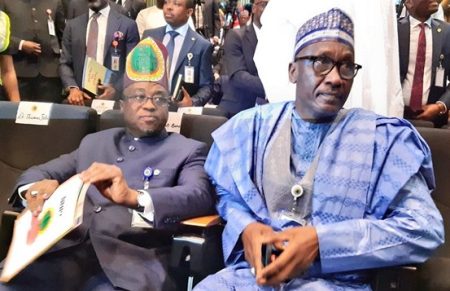November 30, 2011, Sweetcrude, ABUJA — Nigeria’s Federation Account Allocation Committee has disclosed that it withdrew $2 billion from the nation’s excess crude account to finance projects across the country just as the presidential task force on power said privatisation in the power sector would be concluded by second quarter of next year.
Minister of State for Finance, Mr Yerima Ngama, who disclosed this said $2 billion withdrawn from crude oil savings was for “various projects” and distributed more money in October to the three tiers of government than the previous month.
He, however, told reporters that N615.76 billion ($3.85 billion) was distributed from the federation accounts to the three tiers of government for October, up from N611.5 billion in September.
He said: “We also released $2 billion from the Excess Crude Account (ECA) to the various arms of government for completion of various projects.”
Meanwhile, the presidential task force on power said, Tuesday, it hopes to conclude power sector privatisation by the second quarter of next year.
Nigeria holds the world’s seventh largest gas reserves and is Africa’s largest crude oil exporter but only produces enough electricity to power a medium-sized European city.
President Goodluck Jonathan unveiled power privatisation plans 15 months ago and it was pledged that PHCN assets would be sold off this year. Jonathan has set out a ‘transformation agenda’ for Nigeria but plans to end fuel subsidies and reforms to the mainstay energy sector are locked in parliamentary dispute, while a sovereign wealth fund and next year’s budget are delayed.
Power ministry officials said in June that four thermal and two hydro power plants and 11 electricity distribution firms would be sold by the first quarter of next year but this has been shifted back again.
“Nigeria expects to complete privatization of power sector by Q2 2012,” Azu Obiaya, head of the regulation and transactions in the presidential task force on power, said at an industry conference in the commercial-hub Lagos.
He said Nigeria was hoping to produce 6,000 megawatts of power by the end of next year, up from the current 4,000 but still only scratching the surface of the 40,000 megawatts needed for a nation of around 150 million people. Decades of Nigerian administrations have cashed-in on crude exports rather than investing in plants to refine fuel or developing gas for domestic consumption, which means diesel has to be imported at a huge cost for private generators. Nigeria estimates it will need $10 billion a year of investment over the next decade to meet its energy needs.




